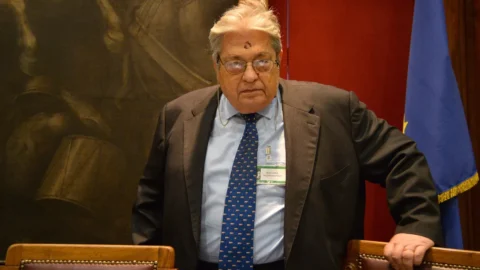Discreet, but friendly, Michael Best, spokesman for Bundesbank President Jens Weidmann, also gives a day of his busy schedule to Italian journalists. It does so in the suggestive setting of Villa Vigoni, the Italian-German cultural exchange center, located in Loveno di Menaggio, on Lake Como. In more than good Italian (“I had a Florentine girlfriend”, he reveals), he gives a speech very similar to the many given in recent years by Jens Weidmann.
After all he is the president's speech writer, with a curriculum that is both economics and journalism. The style of the speech is sharp and dry, of the Bundesbank school. The problem of the Eurozone is a currency without an integrated economy, punctuates Best quoting the former head of the German central bank Karl Blessing, who already in 1963 had glimpsed the dangers of a currency without integration. The Member States now have two options: to improve – i.e. revise – the existing framework, by tightening up fiscal rules, or to give new sovereign powers to Brussels in economic, social and political matters.
No Member State seems willing to follow the latter path, underlines Best, who then calls for measures capable of strengthening the responsibility of institutional actors at all levels. States and banks must be able to fail. This is why the Bundesbank welcomes a single mechanism for restructuring banking institutions, as proposed by the Commissioner for the Internal Market, Michel Barnier.
The federal executive seems to be more skepticalanxious to defend their banks. “The executive takes its time and aims to amend the Treaties…”, says Best slyly. Then she unbuttons a bit: “On our banks I can only say that we have made mistakes in the past. The controls were not adequate. This must be recognized both by BaFin (the German Consob, ed), and by us”.
In short, for the German central bankers it is necessary to continue on the path of financial integration. The banking union must be achieved as soon as possible. Even on the famous government bond purchase program launched last September by Mario Draghi, Best shows himself open and willing to negotiate: “Let's be clear. If the OMT really were like the one described by Professor Schorkopf in his defense brief for the ECB before the Federal Constitutional Court we would have no problem supporting it. But – he continues – the strength of the OMT's announcement is based precisely on its extreme flexibility and its uncertain contours and not on the stakes that Schorkopf made an effort to identify. Indeed, the Governing Council of the ECB could wake up one morning and extend it to five-year bonds or eliminate conditionality. The danger is there."
When asked whether in a period like this it would not be better to have a German as president of the Eurotower, Best brushed aside: “Axel Weber was a man of the Chancellor. If he hadn't resigned, the Chancellor would have had an easy time imposing it. But it was Weber himself who didn't want to. On the one hand, in fact, he had already received offers in the private sector (in the meantime he became CEO of UBS, ed), on the other he couldn't bear the idea of having to be chairman in the minority”. In short, it is better to stay in the rear and fight as an outsider, but without resigning: "Weidmann will not resign, we have seen that it is useless".





